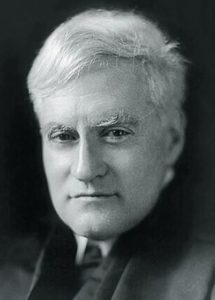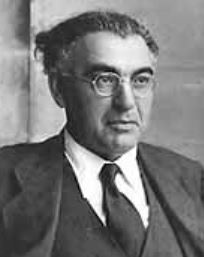Sephardic Supreme Court Justice
 Benjamin Nathan Cardozo (1870-1938) was born in New York City to a traditional Sephardic Jewish family that immigrated to America before the Revolution. The family grew wealthy and influential over the decades, and Cardozo’s father was a New York Supreme Court judge while his uncle (who he was named after) had been vice president of the New York Stock Exchange. His cousin was (former Jew of the Week) Emma Lazarus. Cardozo went into law like his father, studying at Columbia and passing the bar in 1891. After more than two decades of practicing law, the widely beloved Cardozo got elected to the New York Supreme Court. He continued as judge in various positions and on different courts until being appointed to the US Supreme Court in 1932. The New York Times wrote of this that “seldom, if ever, in the history of the Court has an appointment been so universally commended.” It was one of the few cases in American history that a Democrat judge was appointed by a Republican president. (President Hoover originally did not want Cardozo since there was “already a Jew” on the court, Louis Brandeis.) Cardozo went on to be hugely influential in the development of American law. His collected lectures given at Yale University are still standard reading for judges today. He was also a cofounder of the American Law Institute, to “promote the clarification and simplification of the law and its better adaptation to social needs, to secure the better administration of justice, and to encourage and carry on scholarly and scientific legal work.” Totally absorbed in his work, Cardozo never married or had children. He is regarded as one of the greatest Supreme Court justices in American history. Yeshiva University’s Cardozo School of Law is named after him.
Benjamin Nathan Cardozo (1870-1938) was born in New York City to a traditional Sephardic Jewish family that immigrated to America before the Revolution. The family grew wealthy and influential over the decades, and Cardozo’s father was a New York Supreme Court judge while his uncle (who he was named after) had been vice president of the New York Stock Exchange. His cousin was (former Jew of the Week) Emma Lazarus. Cardozo went into law like his father, studying at Columbia and passing the bar in 1891. After more than two decades of practicing law, the widely beloved Cardozo got elected to the New York Supreme Court. He continued as judge in various positions and on different courts until being appointed to the US Supreme Court in 1932. The New York Times wrote of this that “seldom, if ever, in the history of the Court has an appointment been so universally commended.” It was one of the few cases in American history that a Democrat judge was appointed by a Republican president. (President Hoover originally did not want Cardozo since there was “already a Jew” on the court, Louis Brandeis.) Cardozo went on to be hugely influential in the development of American law. His collected lectures given at Yale University are still standard reading for judges today. He was also a cofounder of the American Law Institute, to “promote the clarification and simplification of the law and its better adaptation to social needs, to secure the better administration of justice, and to encourage and carry on scholarly and scientific legal work.” Totally absorbed in his work, Cardozo never married or had children. He is regarded as one of the greatest Supreme Court justices in American history. Yeshiva University’s Cardozo School of Law is named after him.
Words of the Week
… any talk of driving the Jews into the Mediterranean, as we have heard over the last few weeks or the last several years, is not only unrealistic talk, but it is suicidal talk for the whole world and I think also it is terribly immoral. We must see what Israel has done for the world. It is a marvelous demonstration of what people together in unity and with determination, rugged determination, can do in transforming almost a desert into an oasis.
– Martin Luther King, Jr.


